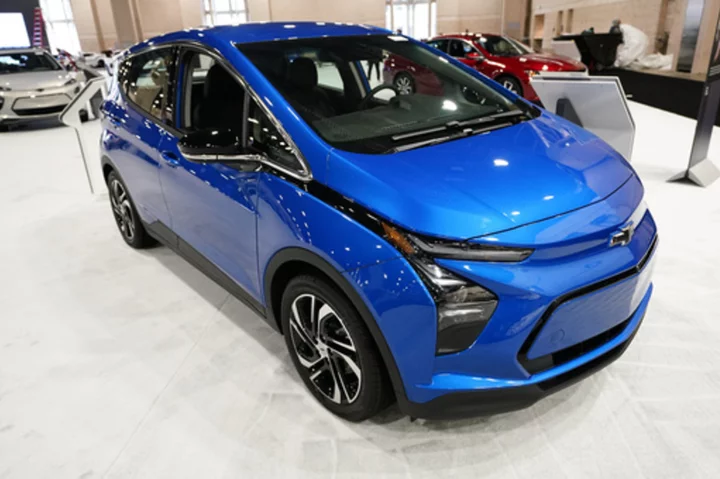DETROIT (AP) — Electric vehicles have proved far less reliable, on average, than gasoline-powered cars, trucks and SUVs, according to the latest survey by Consumer Reports, which found that EVs from the 2021 through 2023 model years encountered nearly 80% more problems than did vehicles propelled by internal combustion engines.
Consumer Reports said EV owners most frequently reported troubles with battery and charging systems as well as flaws in how the vehicles’ body panels and interior parts fit together. The magazine and website noted that EV manufacturers are still learning to construct completely new power systems, and it suggested that as they do, the overall reliability of electric vehicles should improve.
“This story is really one of growing pains,” said Jake Fisher, senior director of auto testing at Consumer Reports. “It's a story of just working out the bugs and the kinks of new technology.”
Still, Consumer Reports noted that lingering concerns about reliability will likely add to the issues that give many buyers pause when considering a switch to the new technology, joining concerns about higher costs, too few charging stations and long charging times.
The growth of electric vehicle sales has slowed sharply since last year. In June 2022, EV sales were growing about 90% year over year. By June of this year the 12-month growth rate had slowed to about 50%, and automakers have become increasingly fearful that the pace will weaken further.
Reflecting that concern, about 3,900 U.S. auto dealers this week signed a letter to President Joe Biden, asking him to rethink what the dealers called unrealistic fuel economy and emissions requirements that could require electric vehicles to reach 67% of total U.S. vehicle sales by 2032.
Consumer enthusiasm for EVs, their letter warned, has stalled.
“They are not selling nearly as fast as they are arriving at our dealerships, even with deep price cuts, manufacturer incentives and generous government incentives,” the letter said.
The Consumer Reports survey also concluded that plug-in hybrids, which can travel on battery power before a gas-electric powertrain kicks in, are more problem-prone than fully electric vehicles. Plug-ins, Fisher pointed out, contain two separate and complex power systems in which glitches can arise. He also noted that brands that over time have proved less reliable, in general, such as Jeep and Volvo, have started mass-producing plug-in hybrids.
But tried-and-true integrated gas-electric hybrid systems are more reliable than gasoline vehicles, largely because they have been in use for about a quarter-century and the bugs have mostly been worked out, Fisher said.
Consumer Reports derived its survey data from subscribers who owned EVs from the 2021 through 2023 model years and compared them with other vehicle types. In calculating a vehicle’s average problem rate, the organization assigned extra weight to serious problems such as battery or engine failures.
EVs from the 2021 and 2022 model years overall had more than twice the problem rates of internal combustion vehicles. The rates were more closely aligned in the 2023 model year: Those EVs had only 21% more problems than gasoline vehicles, Fisher said.
The narrower gap in problems between EVs and combustion vehicles in the 2023 model year, Fisher said, suggested that the reliability of EVs, in general, is improving. Still, he noted, newer vehicles tend to have lower problem rates that rise as they age.
Among the EV owners who have had problems with their vehicles is Michael Coram of Lockport, New York, near Buffalo. In July, intent on reducing his commuting costs, Coram bought a 2023 Chevrolet Bolt electric SUV, attracted by its sporty handling. Coram, 44, a heating and air conditioning technician, said he ran into one annoying problem: On a chilly day in mid-November, his Bolt wouldn't shift into drive.
Eventually, after Coram had turned the car on and off 10 or 12 times, the problem fixed itself, and he hasn't experienced it since. Other owners on a Bolt social media forum told Coram that he might have shifted into drive before the SUV's computer had finished its startup sequence.
“It kind of is a bit too much for the computer to handle,” he said.
Now, Coram waits for all of the dashboard lights to go out before pushing the drive button. He said his dealer told him that mechanics will check the Bolt when a loaner car is available for him.
In 2021, General Motors recalled its popular electric Bolt from the 2017 through 2022 model years to replace the batteries because of manufacturing defects that could cause fires. Fisher said Bolt owners had to limit how much they charged the batteries and had to park them outdoors until replacement batteries became available. Repairs were still being made this year, Fisher said, causing some Bolt owners to report problems in the Consumer Reports survey.
In addition, owners of Hyundai's Ioniq 5 EV reported battery and charging issues related to a charging control computer, which, in some cases, caused the vehicles to stall.
Rivian, an upstart manufacturer of electric pickup trucks and SUVs, had trouble getting body panels to line up correctly and with broken interior parts, Fisher said.
Tesla, the EV sales leader, which now has years of experience building vehicles, showed improvement in reliability, Fisher said. This was largely because a high proportion of Tesla's sales involve the relatively small and less-expensive Model Y SUV and Model 3 cars. Those are simpler to build and lack the glitch-prone new technology that Telsa offers in its more expensive vehicles, the Models S and X.
Tesla ranked 14th out of 30 automotive brands in the 2023 survey, up from 19th in 2022.
Lexus, Toyota's luxury brand, was the most reliable in the survey, followed by Toyota, Mini, Acura and Honda. The five lowest-ranking brands were Jeep, Volkswagen, Rivian, Mercedes-Benz and Chrysler.
The most reliable segment of the market was compact cars, followed by sportscars, small pickups, midsize and large cars, luxury midsize and large cars. Electric cars, electric SUVs, full-size pickups, midsize pickups, and electric pickups had the worst reliability.
Consumer Reports says its survey of subscribers, representing 330,000 vehicles, took place last spring and summer. It asked owners of vehicles from the 2000 through 2023 model years, with a smattering of 2024 models, about problems they had experienced in the previous 12 months.









